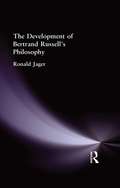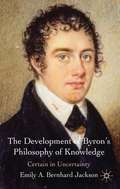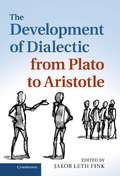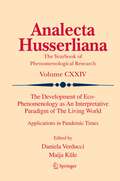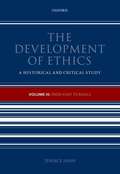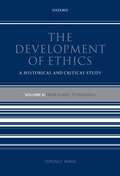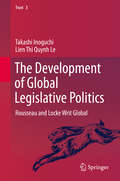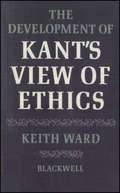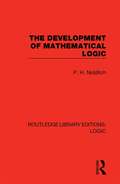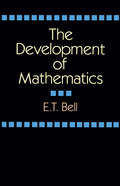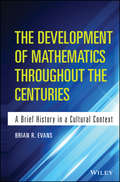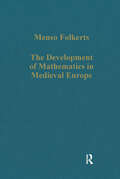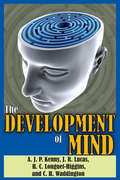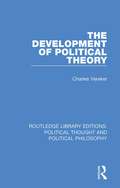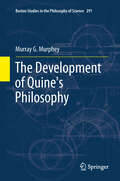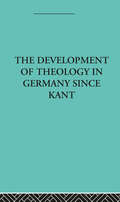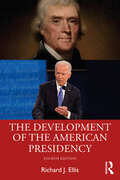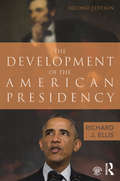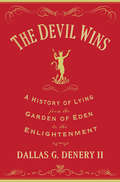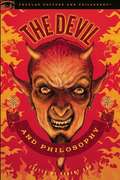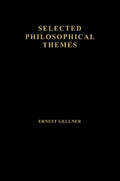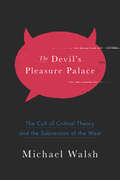- Table View
- List View
The Development of Bertrand Russell's Philosophy
by Jager, RonaldThis is Volume XI of twenty-two in a collection on 20th Century Philosophy. Originally published in 1994, this volume of the Muirhead library of philosophy in the author’s words attempts not what is difficult but what is impossible. What it attempts is a critical account of Russell's philosophy-just that-without supposing that every reader is himself a philosopher at the beginning, though he may be at the end. It is written for those who know of Russell's philosophy and wish to know about it, for those who know about it, and wish to know it.
The Development of Byron's Philosophy of Knowledge
by Emily A. Bernhard JacksonTaking a fresh approach to Byron, this book argues that he should be understood as a poet whose major works develop a carefully reasoned philosophy. Situating him with reference to the thought of the period, it argues for Byron as an active thinker, whose final philosophical stance - reader-centred scepticism - has extensive practical implications.
The Development of Dialectic from Plato to Aristotle
by Jakob Leth FinkThe period from Plato's birth to Aristotle's death (427-322 BC) is one of the most influential and formative in the history of Western philosophy. The developments of logic, metaphysics, epistemology, ethics and science in this period have been investigated, controversies have arisen and many new theories have been produced. But this is the first book to give detailed scholarly attention to the development of dialectic during this decisive period. It includes chapters on topics such as: dialectic as interpersonal debate between a questioner and a respondent; dialectic and the dialogue form; dialectical methodology; the dialectical context of certain forms of arguments; the role of the respondent in guaranteeing good argument; dialectic and presentation of knowledge; the interrelations between written dialogues and spoken dialectic; and definition, induction and refutation from Plato to Aristotle. The book contributes to the history of philosophy and also to the contemporary debate about what philosophy is.
The Development of Eco-Phenomenology as An Interpretative Paradigm of The Living World: Applications in Pandemic Times (Analecta Husserliana #124)
by Daniela Verducci Maija KūleThis volume presents eco-phenomenology’s role in pandemics and post-pandemics and takes up the task of eco-phenomenology as a unified project by not focusing on naturalizing phenomenology but rather exploring the full range of possibilities - such as creative acts and self-individualization – in dealing with ecological threats. Eco-phenomenological developments are based on the main concepts of “phenomenology of life”, as created by Anna-Teresa Tymieniecka. This volume also uniquely explores the Covid-19 pandemic as a phenomenologically interpreted and ecological phenomenon. It appeals to students and researchers working in the fields of phenomenology and environmental philosophy.
The Development of Ethics A Historical and Critical Study Volume III: From Kant to Rawls
by Terence IrwinThis book is a selective historical and critical study of moral philosophy in the Socratic tradition, with special attention to Aristotelian naturalism. It discusses the main topics of moral philosophy as they have developed historically, including: the human good, human nature, justice, friendship, and morality; the methods of moral inquiry; the virtues and their connexions; will, freedom, and responsibility; reason and emotion; relativism, subjectivism, andrealism; the theological aspect of morality. The first volume discusses ancient and mediaeval moral philosophy.
The Development of Ethics: From Suarez to Rousseau
by Terence IrwinThe Development of Ethics is a selective historical and critical study of moral philosophy in the Socratic tradition, with special attention to Aristotelian naturalism. It discusses the main topics of moral philosophy as they have developed historically, including: the human good, human nature, justice, friendship, and morality; the methods of moral inquiry; the virtues and their connexions; will, freedom, and responsibility; reason and emotion; relativism, subjectivism, and realism; the theological aspect of morality. This volume examines early modern moral philosophy from the sixteenth to the eighteenth century. Volume 3 will continue the story up to Rawls's Theory of Justice.<P><P> The present volume begins with Suarez's interpretation of Scholastic moral philosophy, and examines seventeenth- and eighteenth- century responses to the Scholastic outlook, to see how far they constitute a distinctively different conception of moral philosophy. The treatments of natural law by Grotius, Hobbes, Cumberland, and Pufendorf are treated in some detail. Disputes about moral facts, moral judgments, and moral motivation, are traced through Cudworth, Clarke, Balguy, Hutcheson, Hume, Price, and Reid. Butler's defence of a naturalist account of morality is examined and compared with the Aristotelian and Scholastic views discussed in Volume 1. The volume ends with a survey of the persistence of voluntarism in English moral philosophy, and a brief discussion of the contrasts and connexions between Rousseau and earlier views on natural law.<P> The emphasis of the book is not purely descriptive, narrative, or exegetical, but also philosophical. Irwin discusses the comparative merits of different views, the difficulties that they raise, and how some of the difficulties might be resolved. The book tries to present the leading moral philosophers of the past as participants in a rational discussion that is still being carried on, and tries to help the reader to participate in this discussion.
The Development of Global Legislative Politics: Rousseau and Locke Writ Global (Trust #3)
by Takashi Inoguchi Lien Thi LeThis book is the first systematic scientific study of global quasi-legislation. Taking public opinion and multilateral agreements as the international equivalent to national election and passing laws on the national scale, and extending nation-state concepts to a global society, it analyzes citizens' preferences and the state's willingness to enter into 120 multilateral treaties. After identifying the links as a first step toward conceptualizing quasi-legislative global politics, the book examines how each of the 193 states manifests quasi-legislative behavior by factor-analyzing six instrumental variables such as treaty participation index and six policy domains of multilateral treaties, including peace and trade. It then discusses global change between 1989 and 2008, and conceptually and empirically examines the three theories of global politics that originated during that period: the theory of power transition, theory of civilizational clash and theory of global legislative politics. Lastly, it proposes a theory of global legislative politics. Shedding fresh light on the transformative nature of multilateral treaties, this book attracts researchers and students in political philosophy, international law and international relations as well as practitioners and journalists.Inoguchi and Le have developed a genuinely original perspective on world politics, one that opens up a new research agenda for thinking about state and global actors simultaneously.-- Anne-Marie Slaughter, Bert G. Kerstetter '66 University Professor Emerita of Politics and International Affairs, Princeton UniversityThis is one of those books that warrant a global readership given its emphasis on the implied trust that we invest in public institutions as viewed from an interdisciplinary perspective. -- Richard J. Estes, Professor of Social Policy & Practice, University of Pennsylvania, Philadelphia, PennsylvaniaThis book is innovative and distinctive in carving out a new way to look at “global legislative politics.” I do not know of anything that compares in this interesting and novel niche of international relations analysis.-- William R. Thompson, Distinguished Professor and Rogers Chair of Political Science Emeritus, Indiana University
The Development of Kant's View of Ethics
by Keith WardOriginally published in 1972, The Development of Kant's Ethics is Keith Ward's exceptional analysis of the history of Kant's ideas on ethics and the emergence of Kantian ethics as a mature theory. Through a thorough overview of all of Kant's texts written between 1755 and 1804, Ward puts forth the argument that the critical literature surrounding Kantian ethics has underplayed Kant's concern with the role of happiness in relation to morality and the significance of the tradition of natural law for the development of Kantian ethics. Covering all of Kant's extant works from Nova Dilucidatio to Opus Postumum, Ward traces the progression of Kant's views from his early ideas on Rationalism to Moral Sense Theory and the development of Critical Philosophy, and finally to his later-life writings on the relationship between morality and faith. Through careful analysis of each of Kant's works, Ward details the scientific, philosophical, and theological ideas that influenced Kant—such as the works of Emanuel Swedenborg—and demonstrates the critical role these influences played in the development of Kantian ethics. Offering a rare and extraordinary historical view of some of Kant's most important contributions to philosophy, this is an invaluable resource for scholars engaged in questions on the origins and influences of Kant's work, and for students seeking a thorough understanding of Kant's historical and philosophical contexts.
The Development of Mathematical Logic (Routledge Library Editions: Logic)
by P. H. NidditchOriginally published in 1962. A clear and simple account of the growth and structure of Mathematical Logic, no earlier knowledge of logic being required. After outlining the four lines of thought that have been its roots - the logic of Aristotle, the idea of all the parts of mathematics as systems to be designed on the same sort of plan as that used by Euclid and his Elements, and the discoveries in algebra and geometry in 1800-1860 - the book goes on to give some of the main ideas and theories of the chief writers on Mathematical Logic: De Morgan, Boole, Jevons, Pierce, Frege, Peano, Whitehead, Russell, Post, Hilbert and Goebel. Written to assist readers who require a general picture of current logic, it will also be a guide for those who will later be going more deeply into the expert details of this field.
The Development of Mathematics
by E. T. Bell"This important book . . . presents a broad account of the part played by mathematics in the evolution of civilization, describing clearly the main principles, methods, and theories of mathematics that have survived from about 4000 BC to 1940."- BooklistIn this time-honored study, one of the 20th century's foremost scholars and interpreters of the history and meaning of mathematics masterfully outlines the development of its leading ideas, and clearly explains the mathematics involved in each. According to the author, a professor of mathematics at the California Institute of Technology from 1926 until his death in 1960, it is "not a history of the traditional kind, but a narrative of the decisive epochs in the development of mathematics." It is a narrative filled with compelling insights of special interest to every mathematician, engineer, and scientist.Main trends in mathematics from approximately 4000 BC to the 20th century are presented through analyses of typical major episodes in each. The author first examines the evolution of mathematical ideas in the ancient civilizations of Egypt and Babylonia; later developments in India, Arabia, and Spain; and other achievements worldwide through the 16th century. Professor Bell then traces the beginnings of modern mathematics in the 17th century, and the emergence of the importance of extensions of number, mathematical structure, the generalization of arithmetic, and structural analysis. Compelling accounts of major breakthroughs in the 19th and 20th centuries follow, emphasizing rational arithmetic after Fermat, contributions from geometry, and topics as diverse as generalized variables, abstractions, differential equations, invariance, uncertainties, and probabilities. Throughout, Professor Bell subordinates details of mere antiquarian interest - involving concepts and ideas that did not succeed or bear fruit - in favor of the fullest possible exposition of those elements still alive in mathematics.
The Development of Mathematics Throughout the Centuries: A Brief History in a Cultural Context
by Brian EvansThroughout the book, readers take a journey throughout time and observe how people around the world have understood these patterns of quantity, structure, and dimension around them. The Development of Mathematics Throughout the Centuries: A Brief History in a Cultural Contex provides a brief overview of the history of mathematics in a very straightforward and understandable manner and also addresses major findings that influenced the development of mathematics as a coherent discipline. This book: Highlights the contributions made by various world cultures including African, Egyptian, Babylonian, Chinese, Indian, Islamic, and pre-Columbian American mathematics Features an approach that is not too rigorous and is ideal for a one-semester course of the history of mathematics. Includes a Resources and Recommended Reading section for further exploration and has been extensively classroom-tested
The Development of Mathematics in Medieval Europe: The Arabs, Euclid, Regiomontanus (Variorum Collected Studies)
by Menso FolkertsThe Development of Mathematics in Medieval Europe complements the previous collection of articles by Menso Folkerts, Essays on Early Medieval Mathematics, and deals with the development of mathematics in Europe from the 12th century to about 1500. In the 12th century European learning was greatly transformed by translations from Arabic into Latin. Such translations in the field of mathematics and their influence are here described and analysed, notably al-Khwarizmi's "Arithmetic" -- through which Europe became acquainted with the Hindu-Arabic numerals -- and Euclid's "Elements". Five articles are dedicated to Johannes Regiomontanus, perhaps the most original mathematician of the 15th century, and to his discoveries in trigonometry, algebra and other fields. The knowledge and application of Euclid's "Elements" in 13th- and 15th-century Italy are discussed in three studies, while the last article treats the development of algebra in South Germany around 1500, where much of the modern symbolism used in algebra was developed.
The Development of Mind
by William McCordThe experimental and highly regarded Gifford Lectures at Edinburgh University was endowed in the late nineteenth century. Over the years, participants have including many leading representatives of religion, science, and philosophy. This series has as its subject, The Development of Mind. First published in 1972, the series continues to attract widespread interest. In this volume, contributors argue about the mind from diverse analytical standpoints.The focus of the series remains the relationship between religion, science, and philosophy. This volume attempts to achieve a comprehensive view of the subject of mind. The mental development of children in the light of modern psychology is discussed, and the distinction between "how" and "why" questions is put forward with clarity. The development of mind is further contrasted with the evolution of embryos in the young. The mind is considered as a capacity for intellectual activity, and as a multi-purpose program. Goal-directed behavior and language development are given importance, and issues of cosmic purpose, and the how and why of evolution, are never far from the surface of the argument.The lecturers know their opposition and their positions, and the cut-and-thrust of the discussion has much acumen and wit to it. Issues ranging from the impact of mind on theories of religion, causation, and rational will are examined in an informal, yet compelling, manner.
The Development of Political Theory (Routledge Library Editions: Political Thought and Political Philosophy #54)
by Charles VerekerOriginally published in 1957, this short essay on an intricate historical theme, to which, according to the author, it is customary and proper to devote large volumes, was designed to whet but not to satisfy the appetite. The chapters provide the framework for a presentation of the views of theorists from Plato to Lenin on the character and purpose of political association. Its perusal will, the author hoped, provoke a wider and more intense study of social and political thought; it was not intended to be regarded or used as a substitute for further reading and reflection but as an invitation to prosecute these activities.
The Development of Quine's Philosophy
by Murray MurpheyThis book covers W. V. Quine's philosophic career from his early radical empiricism and behaviorism through his development of a series of skeptical doctrines regarding meaning, reference, and science. It shows what problems he tried to solve and what his solutions were. Result has been a series of highly controversial claims that have won him international fame. His work is still a center of controversy and has lead to an enormous literature of commentary.
The Development of Rational Theology in Germany since Kant: And its Progress in Great Britain since 1825
by Otto PfleidererFirst published in 2002. Routledge is an imprint of Taylor & Francis, an informa company.
The Development of the American Presidency
by Richard EllisA full understanding of the institution of the American presidency requires us to examine how it developed from the founding to the present. This developmental lens, analyzing how historical turns have shaped the modern institution, allows for a richer, more nuanced understanding. The Development of the American Presidency pays great attention to that historical weight but is organized by the topics and concepts relevant to political science, with the constitutional origins and political development of the presidency its central focus. Through comprehensive and in-depth coverage, Richard J. Ellis looks at how the presidency has evolved in relation to the public, to Congress, to the executive branch, and to the law, showing at every step how different aspects of the presidency have followed distinct trajectories of change. Each chapter promotes active learning, beginning with a narrative account of some illustrative puzzle that brings to life a central concept. A wealth of photos, figures, and tables allow for the visual presentations of concepts.New to the Fourth Edition Explicit and expanded attention to the role of norms in shaping and constraining presidential power, with special focus on Trump’s norm-breaking and Biden’s efforts to shore up norms; Enhanced focus on the prospects for institutional reform, including in the electoral college, presidential relations with Congress, war powers, and the selection of Supreme Court justices; A full reckoning with the Trump presidency and its significance for the future of American democracy, presidential rhetoric, the unilateral executive, and the administrative state; Coverage of the first year of Biden’s presidency, including presidential rhetoric, relations with Congress and the bureaucracy, use of the war powers, and unilateral directives; Comprehensive updating of debates about the removal power, including the Supreme Court cases of Seila Law v. CFPB and Collins v. Yellen; In-depth exploration of the impact of partisan polarization on the legislative presidency and effective governance; Analysis of the 2020 election and its aftermath; Expanded discussion of impeachment to incorporate Trump’s two impeachments; Examination of presidential emergency powers, with special attention to Trump’s border wall declaration; Review of Biden’s and Trump’s impact on the judiciary; Assessment of Biden’s and Trump’s place in political time.
The Development of the American Presidency
by Richard J. EllisA full understanding of the institution of the American presidency requires us to examine how it developed from the founding to the present. This developmental lens, analyzing how historical turns have shaped the modern institution, allows for a richer, more nuanced understanding. The Development of the American Presidency pays great attention to that historical weight but is organized by the topics and concepts relevant to political science, with the constitutional origins and political development of the presidency its central focus. Through comprehensive and in-depth coverage, Richard J. Ellis looks at how the presidency has evolved in relation to the public, to Congress, to the executive branch, and to the law, showing at every step how different aspects of the presidency have followed distinct trajectories of change. Each chapter promotes active learning, beginning with a narrative account of some illustrative puzzle that brings to life a central concept. A wealth of photos, figures, and tables allow for the visual presentations of concepts. New to the Fourth Edition Explicit and expanded attention to the role of norms in shaping and constraining presidential power, with special focus on Trump’s norm-breaking and Biden’s efforts to shore up norms; Enhanced focus on the prospects for institutional reform, including in the electoral college, presidential relations with Congress, war powers, and the selection of Supreme Court justices; A full reckoning with the Trump presidency and its significance for the future of American democracy, presidential rhetoric, the unilateral executive, and the administrative state; Coverage of the first year of Biden’s presidency, including presidential rhetoric, relations with Congress and the bureaucracy, use of the war powers, and unilateral directives; Comprehensive updating of debates about the removal power, including the Supreme Court cases of Seila Law v. CFPB and Collins v. Yellen; In-depth exploration of the impact of partisan polarization on the legislative presidency and effective governance; Analysis of the 2020 election and its aftermath; Expanded discussion of impeachment to incorporate Trump’s two impeachments; Examination of presidential emergency powers, with special attention to Trump’s border wall declaration; Review of Biden’s and Trump’s impact on the judiciary; Assessment of Biden’s and Trump’s place in political time.
The Development of the American Presidency: The Rhetorical Presidency In Historical Perspective (Political Development Of The American Nation Ser.)
by Richard J. EllisOur understanding of the politics of the presidency is greatly enhanced by viewing it through a developmental lens, analyzing how historical turns have shaped the modern institution. The Development of the American Presidency pays great attention to that historical weight but is organized topically and conceptually with the constitutional origins and political development of the presidency its central focus. Through comprehensive and in-depth coverage, this text looks at how the presidency has evolved in relation to the public, to Congress, to the Executive branch, and to the law, showing at every step how different aspects of the presidency have followed distinct trajectories of change. All the while, Ellis illustrates the institutional relationships and tensions through stories about particular individuals and specific political conflicts. Ellis's own classroom pedagogy of promoting active learning and critical thinking is well reflected in these pages. Each chapter begins with a narrative account of some illustrative puzzle that brings to life a central concept. A wealth of photos, figures, and tables allow for the visual presentations of concepts. A companion website not only acts as a further resources base--directing students to primary documents, newspapers, and data sources--but also presents interactive timelines, practice quizzes, and key terms to help students master the book's lessons.
The Devil Wins
by Dallas G. Denery IIIs it ever acceptable to lie? This question plays a surprisingly important role in the story of Europe's transition from medieval to modern society. According to many historians, Europe became modern when Europeans began to lie--that is, when they began to argue that it is sometimes acceptable to lie. This popular account offers a clear trajectory of historical progression from a medieval world of faith, in which every lie is sinful, to a more worldly early modern society in which lying becomes a permissible strategy for self-defense and self-advancement. Unfortunately, this story is wrong.For medieval and early modern Christians, the problem of the lie was the problem of human existence itself. To ask "Is it ever acceptable to lie?" was to ask how we, as sinners, should live in a fallen world. As it turns out, the answer to that question depended on who did the asking. The Devil Wins uncovers the complicated history of lying from the early days of the Catholic Church to the Enlightenment, revealing the diversity of attitudes about lying by considering the question from the perspectives of five representative voices--the Devil, God, theologians, courtiers, and women. Examining works by Augustine, Bonaventure, Martin Luther, Madeleine de Scudéry, Jean-Jacques Rousseau, and a host of others, Dallas G. Denery II shows how the lie, long thought to be the source of worldly corruption, eventually became the very basis of social cohesion and peace.
The Devil and Philosophy
by Robert ArpIn The Devil and Philosophy, 34 philosophers explore questions about one of the most recognizable and influential characters (villains?) of all time. From Roman Polanski's The Ninth Gate to J.R.R. Tolkien's The Silmarillion to Bram Stoker's Dracula to Darth Vader to Al Pacino's iconic performance in The Devil's Advocate, this book demonstrates that a little devil goes a long way. From humorous appearances, as in Kevin Smith's film Dogma and Chuck Palahniuk's novels Damned and its sequel Doomed, to more villanous appearances, such as Gabriel Byrne's cold outing as Satan in End of Days, The Devil in Philosophy proves that the Devil comes in many forms.Through the lenses of Jung, Kant, Kundera, Balkan, Plato, Bradwardine, Aristotle, Hume, Blackburn, Descartes, Lavey, Thoreau, and Aquinas, The Devil and Philosophy take a philosophical look at one of time's greatest characters. Are there any good arguments for the actual existence of the Devil? Does demonic evil thrive in Gotham City? Can humans really be accountable for all evil? Which truths about the Devil are actual facts? Is Milton correct, in that the Devil believes he is doing good?
The Devil in Modern Philosophy
by Ernest GellnerThe essays in this volume gather together Gellner's thinking on the connection between philosophy and life and they approach the topic from a number of directions: philosophy of morals, history of ideas, a discussion of individuals including R. G. Collingwood, Noam Chomsky, Piaget and Eysenck and discussions on the setting of philosophy in the general culture of England and America.
The Devil's Notebook
by Anton Szandor LaveyWisdom, humor, and dark observations by the founder of the Church of Satan. LaVey ponders such topics as nonconformity, occult faddism, erotic politics, the "Goodguy badge," demoralization and the construction of artificial human companions.
The Devil's Pleasure Palace
by Michael WalshIn the aftermath of World War II, America stood alone as the world's premier military power. Yet its martial confidence contrasted vividly with its sense of cultural inferiority. Still looking to a defeated and dispirited Europe for intellectual and artistic guidance, burgeoning trans-national elite in New York and Washington embraced not only the war's refugees, but many of their ideas as well, and nothing has proven more pernicious than those of the Frankfurt School and its reactionary philosophy of "critical theory." At once overly intellectualized and emotionally juvenile, Critical Theory - like Pandora's Box - released a horde of demons into the American psyche. When everything could be questioned, nothing could be real, and the muscular, confident empiricism that had just won the war gave way, in less than a generation, to a central-European nihilism celebrated on college campuses across the United States. Seizing the high ground of academe and the arts, the New Nihilists set about dissolving the bedrock of the country, from patriotism to marriage to the family to military service; they have sown (as Cardinal Bergoglio - now Pope Francis - once wrote of the Devil) "destruction, division, hatred, and calumny" - and all disguised as the search for truth.In The Devil's Pleasure Palace we will look at the ways Critical Theory took root in America and, once established and gestated, has affected nearly every aspect of American life and society - and what can be done to stop it.
